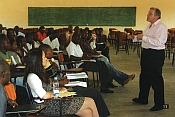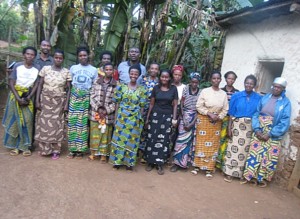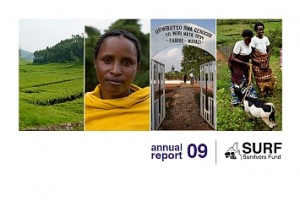Home » Archives for David Russell » Page 71
Last year, in partnership with the UK Conservative Party, SURF developed an Education into Employment programme to support young survivors at university in Rwanda to secure a job on graduation. This was developed by a group from Project Umubano, the … Continue Reading »
A significant aspect of our work at Survivors Fund (SURF) is reporting – reporting on our own progress, that of our partner organisations, as well as the situation of survivors in Rwanda and the UK. During my current visit to … Continue Reading »
Earlier this month, the Board of Trustees of Survivors Fund (SURF) approved our Annual Report for 2009. You can download it here, or by clicking on the front cover below: We will be uploading to the website a more user-friendly … Continue Reading »
A primary focus of SURF’s work is rebuilding the lives of survivors by working with our partner organisations to increase numbers of those with secure and sustainable livelihoods. Our largest funder in 2009 was the Charities Advisory Trust which, through … Continue Reading »
SURF was founded with an objective to raise funding internationally for survivors of the genocide in Rwanda. In her memoir, You Alone May Live, SURF Founder, Mary Kayitesi Blewitt, recalls her first few months of work on her return from … Continue Reading »
In many elements of SURF’s work addressing the consequences of the Rwandan genocide, there is a relation to the Holocaust as well as other genocides too. On our current project with UK-based survivors and schools, we have been privileged to … Continue Reading »
Over the past month, SURF has organised three workshops with schools from London, Oxford and Rugby to enable students to meet with and interview UK-based survivors of the Rwandan genocide about their lives before and after genocide, and experience during … Continue Reading »
We are fortunate to receive many visitors to this, our website. We now average more than 3,000 unique visitors each month. Many of the visitors are from educational institutions, searching for statistics on the genocide. Others are supporters, wanting an … Continue Reading »
In previous posts I have addressed the issue of forgiveness in Rwanda, but I wanted to post again following a superb lecture I attended yesterday by Archbishop Desmond Tutu on “Is violence ever justified?” The lecture was followed by a panel … Continue Reading »
Last week I attended an excellent free training workshop on Stewardship, organised by the fsi (Foundation for Social Improvement). I knew little about the fsi or stewardship before the workshop, but left much the wiser at the end of the … Continue Reading »










